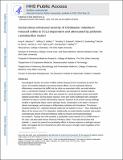Social stress-enhanced severity of Citrobacter rodentium-induced colitis is CCL2-dependent and attenuated by probiotic Lactobacillus reuteri
Author(s)
Mackos, A R; Galley, J D; Eubank, T D; Easterling, R S; Lyte, M; Bailey, M T; Parry, Nicola; Fox, James G; ... Show more Show less
Downloadnihms714050.pdf (1.783Mb)
OPEN_ACCESS_POLICY
Open Access Policy
Creative Commons Attribution-Noncommercial-Share Alike
Terms of use
Metadata
Show full item recordAbstract
Psychological stressors are known to affect colonic diseases but the mechanisms by which this occurs, and whether probiotics can prevent stressor effects, are not understood. Because inflammatory monocytes that traffic into the colon can exacerbate colitis, we tested whether CCL2, a chemokine involved in monocyte recruitment, was necessary for stressor-induced exacerbation of infectious colitis. Mice were exposed to a social disruption stressor that entails repeated social defeat. During stressor exposure, mice were orally challenged with Citrobacter rodentium to induce a colonic inflammatory response. Exposure to the stressor during challenge resulted in significantly higher colonic pathogen levels, translocation to the spleen, increases in colonic macrophages, and increases in inflammatory cytokines and chemokines. The stressor-enhanced severity of C. rodentium-induced colitis was not evident in CCL2[superscript −/−] mice, indicating the effects of the stressor are CCL2-dependent. In addition, we tested whether probiotic intervention could attenuate stressor-enhanced infectious colitis by reducing monocyte/macrophage accumulation. Treating mice with probiotic Lactobacillus reuteri reduced CCL2 mRNA levels in the colon and attenuated stressor-enhanced infectious colitis. These data demonstrate that probiotic L. reuteri can prevent the exacerbating effects of stressor exposure on pathogen-induced colitis, and suggest that one mechanism by which this occurs is through downregulation of the chemokine CCL2.
Date issued
2015-09Department
Massachusetts Institute of Technology. Department of Biological Engineering; Massachusetts Institute of Technology. Division of Comparative MedicineJournal
Mucosal Immunology
Publisher
Nature Publishing Group
Citation
Mackos, A R et al. “Social Stress-Enhanced Severity of Citrobacter Rodentium-Induced Colitis Is CCL2-Dependent and Attenuated by Probiotic Lactobacillus Reuteri.” Mucosal Immunology 9.2 (2016): 515–526.
Version: Author's final manuscript
ISSN
1933-0219
1935-3456